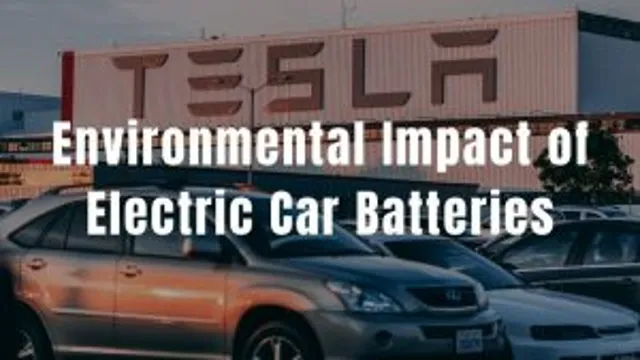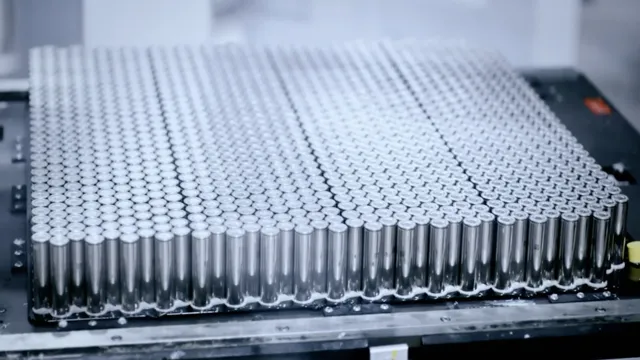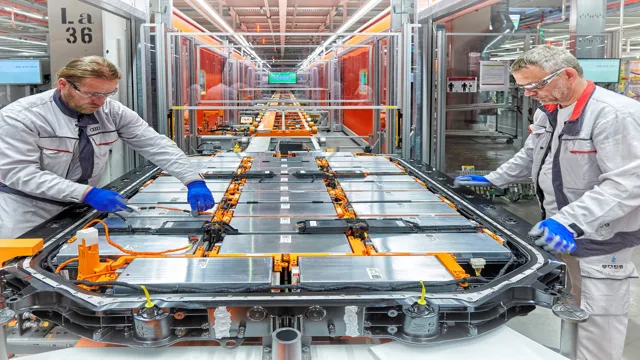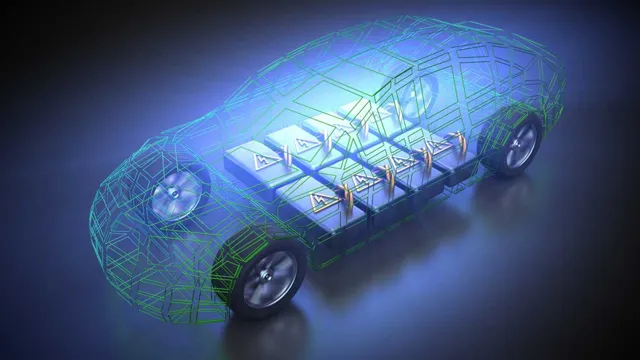The Shocking Truth About Batteries for Electric Cars: Examining Their Environmental Impact
Battery power has become an increasingly popular option for our daily energy needs. It’s convenient, efficient, and reliable, making it a go-to for many people. However, have you ever wondered about the environmental impact of batteries? With the rise of electric cars and portable electronics, the demand for batteries has increased, and this has significant implications for the environment.
In this blog, we’ll dive into the topic of battery power and environmental impact, exploring the ways in which batteries can impact the planet and what we can do to mitigate their effects. From the extraction of raw materials to the disposal of used batteries, we’ll take a closer look at this complex issue and shed light on what it means for us and future generations. So, let’s get started!
Battery Recycling Efforts
When considering the impact of electric cars on the environment, it’s important to take into account the batteries they use. While these batteries offer cleaner and more efficient energy, they can also have a negative impact if not disposed of properly. That’s where battery recycling efforts come in.
By recycling these batteries, we can not only reduce the amount of waste we produce but also recover valuable materials such as lithium and cobalt. This not only reduces the environmental impact of producing new batteries but can also lead to cost savings for manufacturers. Overall, it’s essential that we continue to support battery recycling efforts as we work towards a more sustainable future.
Statistics of Battery Recycling
“battery recycling” Battery recycling efforts have grown significantly in recent years, as society becomes more aware of the environmental impact of discarded batteries. In fact, according to a recent report, the global battery recycling market is predicted to reach nearly 11 billion dollars by 202 This growth is driven not only by increasing concern for the planet, but also by the potential profits that can be made from recycled materials.
For example, lithium-ion batteries contain valuable metals like cobalt and nickel, which can be extracted and sold. However, despite this growth, battery recycling is still a relatively new industry, with many challenges to be faced. One of the main hurdles is making it more accessible to consumers.
Many people are unaware of the benefits of battery recycling, or are unsure where to recycle their old batteries. This highlights the importance of education campaigns and increased availability of recycling facilities. However, with continued efforts and investment, battery recycling has the potential to significantly reduce the environmental impact of discarded batteries, while also providing economic benefits.

Impact of Recycling on Environment
Battery recycling efforts are essential in addressing the environment’s impact, especially considering the numerous types of toxic chemicals and metals present in batteries. Batteries are disposed of daily, and if not appropriately recycled, their contents find their way into the soil, air, and water sources, causing pollution. The recycling process aims to convert used batteries into reusable materials while maintaining safety and health standards, reducing the environmental impact.
Recycling saves raw materials and energy needed to create new batteries, slows down pollution, reduces landfill space, and conserves natural resources. Recycling facilities are becoming more accessible, and society is developing innovative ways of utilizing the recovered contents from batteries. Recycling also creates job opportunities and stimulates the economy while ensuring environmental sustainability.
To support eco-friendly battery recycling, consumers must dispose of batteries properly and encourage government policies geared towards environmental protection. Everyone can contribute to creating a more sustainable world, and battery recycling is one of the many solutions available.
Lifecycle Analysis of Electric Car Batteries
When it comes to reducing our carbon footprint, electric cars are often touted as a great solution. However, even with zero emissions on the road, batteries for electric cars have an environmental impact that needs to be considered. Lifecycle analysis is the process of evaluating the environmental impact of a product from its creation to its disposal.
It includes the extraction of raw materials, production, use, and end-of-life management. In the case of electric car batteries, a significant portion of their environmental impact occurs during the extraction and processing of raw materials, such as nickel, cobalt, and lithium. These materials can be found in regions of the world with weak environmental standards and can contribute to deforestation, soil degradation, and water pollution.
However, the impact of batteries over their entire lifecycle is still significantly lower than that of fossil fuel-powered vehicles. As technology and regulations continue to evolve, we can hope for even greater improvements in the environmental impact of batteries for electric cars.
Materials Used in Battery Production
Electric Car Batteries The production of electric car batteries involves a complex process that requires various materials. Some of the common materials used in the production of an electric car battery include lithium, nickel, cobalt, and manganese. However, the environmental impact of these materials is a great concern.
Lifecycle analysis of electric car batteries seeks to evaluate the environmental impact of manufacturing, use, and disposal of the batteries. This analysis considers the energy, resources, and materials required in the production, transportation, and maintenance of the batteries. Lifecycle analysis of electric car batteries is essential in achieving sustainable emissions reductions and minimizing the environmental impact of electric vehicles.
It is, therefore, crucial to continue research and development of alternative materials and technologies that can replace the current materials utilized in battery production.
Carbon Emissions Generated During Production
When it comes to electric cars, one of the biggest concerns people have is how environmentally friendly they really are. While it’s true that electric cars don’t produce any emissions while driving, the manufacturing process still generates carbon emissions. This is why a lot of research has been done on the lifecycle analysis of electric car batteries.
Essentially, this means looking at the carbon emissions generated during all the stages of a battery’s life, from production to disposal or recycling. The results have been largely positive, with studies showing that even when you account for the emissions generated during production, electric cars are still significantly better for the environment than traditional gas-powered cars. Of course, this doesn’t mean that we should stop trying to reduce emissions even further, but it’s an encouraging sign that electric cars are a step in the right direction.
End of Life Impact on the Environment
Electric car batteries have a significant impact on the environment, from the mining of raw materials to their eventual disposal. Lifecycle analysis (LCA) is a tool used to assess the environmental impact of a product throughout its entire life cycle. LCAs of electric car batteries have shown that the majority of their environmental impact comes from their production and disposal.
The raw materials used in electric car batteries require a significant amount of energy to mine and process, leading to increased greenhouse gas emissions. On the other end of their life cycle, electric car batteries must be properly disposed of, as they contain materials that are harmful to the environment and human health. However, electric car batteries can also have a positive impact on the environment when used and disposed of properly.
When paired with renewable energy sources, electric cars can drastically reduce greenhouse gas emissions and contribute to a more sustainable future. Additionally, the recycling of electric car batteries can help to conserve valuable resources and reduce waste. Overall, proper management of electric car batteries throughout their lifecycle is crucial for minimizing their impact on the environment.
The Future of Sustainable Battery Technology
As the world shifts to a more sustainable future, batteries for electric cars are an essential piece of technology that will lower our dependence on fossil fuels. However, there’s no denying that producing these batteries has an environmental impact. That’s why researchers are working to develop new, sustainable battery technologies.
One promising development is the use of solid-state batteries, which use solid electrolytes instead of the liquid or gel-like electrolytes found in current lithium-ion batteries. Solid-state batteries are not only more energy-dense, but they’re also safer and have a longer lifespan than traditional batteries. Additionally, some researchers are exploring batteries made from natural materials, such as sodium, which is much more abundant and less damaging to extract than lithium.
As we continue to move towards a sustainable future, these new battery technologies will play a crucial role in reducing our impact on the environment, while still allowing us to benefit from the convenience and efficiency of electric cars.
Alternative Battery Materials
As we progress towards a greener future, the materials used in batteries are also evolving to meet the demand for sustainable technology. Alternative battery materials, such as lithium-sulfur or sodium-ion, are showing promise to replace the traditional lithium-ion batteries that dominate the market currently. Lithium-sulfur batteries have a higher energy density, meaning they can store more energy, and are also cheaper to produce.
On the other hand, sodium-ion batteries have a lower environmental impact as the materials used in these batteries are abundant and easily recyclable. The shift towards these alternative materials could not only provide us with more efficient and sustainable batteries, but also reduce the reliance on rare and expensive materials. With more research and development, these alternative battery materials could revolutionize the way we power our devices and help us move towards a more sustainable future.
Improvements in Battery Charging and Efficiency
The future of sustainable battery technology looks bright as researchers around the world are making groundbreaking advancements in battery charging and efficiency. With the rise of green energy and the push towards electric vehicles, finding better and more sustainable battery technology is essential. One promising development is the use of solid-state batteries, which provide higher energy density, longer lifetimes, and improved safety over traditional lithium-ion batteries.
Beyond that, innovations like wireless charging and fast charging technology promise to make battery charging more convenient and streamlined. As technology continues to advance, the possibilities for sustainable battery solutions are endless. It’s exciting to think about a future where we can power our homes and vehicles with eco-friendly batteries that are more efficient and effective than ever before.
Government Policies and Incentives
The future of sustainable battery technology is looking bright thanks to government policies and incentives that encourage innovation in this area. Many countries now have targets for reducing greenhouse gas emissions, and batteries play a key role in achieving these goals. As a result, governments are offering financial support to companies working on sustainable battery technology, as well as providing tax incentives and funding research projects.
For example, the European Union has pledged to invest €2 billion into battery technology over the next seven years, while the United States government has introduced tax credits for companies that produce clean energy storage solutions. The hope is that these policies and incentives will encourage the development of batteries that are more efficient, longer lasting, and better for the environment.
This could lead to a future where electric vehicles and renewable energy sources are more accessible and affordable for everyone.
Conclusion: Balancing the Benefits and Costs of Electric Cars
In conclusion, the use of batteries in electric cars has undeniable environmental benefits, but we must also acknowledge the impact of their production and disposal. While electric cars are clearly a step in the right direction towards a more sustainable future, we must continue to strive for even more sustainable solutions and make sure that our pursuit of green technology is not having any unintended consequences. So, let’s drive towards a cleaner future, but let’s not forget to keep our environmental impact in check.
After all, we don’t want to run out of juice too soon.”
FAQs
What is the environmental impact of using batteries in electric cars?
The environmental impact of using batteries in electric cars can vary based on several factors, including the type of battery used, the energy source used to charge the battery, and the end-of-life disposal or recycling of the battery.
Do electric cars with larger batteries have a greater environmental impact?
Electric cars with larger batteries typically have a greater environmental impact due to the increased materials and energy required to manufacture and charge a larger battery. However, the impact can also depend on the specific battery chemistry and how the battery is recycled or disposed of.
Are there any alternative technologies to batteries for electric cars?
Yes, there are alternative technologies to batteries for electric cars, such as hydrogen fuel cells. However, these technologies also have their own environmental impact and may not be as widely available or as widely researched as battery technology.
How can the environmental impact of batteries for electric cars be minimized?
The environmental impact of batteries for electric cars can be minimized through a variety of methods, such as using renewable energy sources to charge the battery, improving battery recycling programs, and reducing the overall demand for personal transportation through alternative transportation options.





